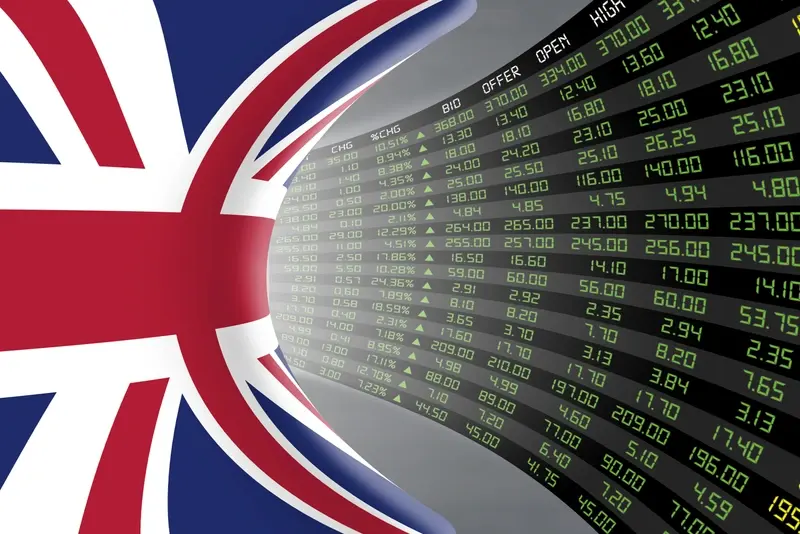
London’s FTSE 100 achieved a two-month closing high on Friday, as the blue-chip index nudged higher at the end of a bullish week.
The FTSE 100 index ended up 17.68 points, 0.2%, at 7,663.73. For the week, it rose 3.5%, with most of its gain stemming from a cooler UK inflation reading.
Central banks, as well as a slew of corporate earnings, take centre-stage next week. Ahead of the Federal Reserve decision next week Wednesday, the dollar was largely on the up. The European Central Bank announces a decision on Thursday, before the Bank of Japan on Friday.
The FTSE 250 closed down 111.28 points, 0.6%, at 19,200.45 on Friday, and the AIM All-Share rose 2.26 points, 0.3%, at 766.55.
For the week, the FTSE 250 rose 3.4% and the AIM All-Share Index rose 2.1%.
The Cboe UK 100 edged up 0.1% to 764.44 on Friday, the Cboe UK 250 lost 0.5% to 16,859.56, and the Cboe Small Companies closed flat at 13,693.57.
In European equities on Friday, the CAC 40 in Paris closed up 0.7%, though the DAX 40 in Frankfurt closed down 0.2%.
Lifting the mood slightly in London was a better-than-expected UK retail sales reading.
UK retail sales volumes rose more than expected in June from the previous month, according to government data on Friday.
The Office for National Statistics said retail sales fell 1.0% annually in June, compared to a revised 2.3% decline in May. The market had been expecting a 1.5% fall, according to FXStreet-cited consensus.
May’s annual reading was first estimated at a 2.1% fall.
From the previous month, sales rose 0.7% in June, picking up speed from a downwardly revised 0.1% rise in May. June’s reading topped market consensus, which had forecast a 0.2% rise.
May’s increase was initially reported as 0.3%.
Separate data, however, showed consumer confidence in the UK suffered a sudden collapse amid relentless inflation and rising interest rates, according to a long-running survey.
GfK’s Consumer Confidence Index plunged six points in July to minus 30, with concerns for personal finances and the wider UK economy over the coming year down six and eight points respectively.
Berenberg analyst Kallum Pickering said UK consumers are ‘still miserable [but] still spending’.
‘The latest batch of consumer data for the UK suit our call that economic activity will remain lacklustre in the near-term as still-high (but easing) inflation and tight financial conditions restrain economic momentum. While the jump in real retail sales excluding auto fuel in June highlights a degree of resilience, the temporary surge in interest rate expectations and fears of further house price declines knocked back confidence in July. Retail spending may thus temporally soften again through Q3 before picking up momentum as part of a broadening economic recovery heading into 2024,’ the analyst added.
The pound was quoted at $1.2852 late Friday in London, flat against $1.2851 at the equities close on Thursday. The euro stood at $1.1121, lower against $1.1144. Against the yen, the dollar was trading at JP¥141.64, higher compared to JP¥140.31.
Analysts at ING expect the Fed to ‘keep up the squeeze with another 25 basis point hike’ next week.
‘Inflation is moderating but remains well above target and with a tight jobs market and resilient activity, officials may feel they can’t take any chances. The Fed will continue to signal the prospect of further hikes, but with the credit cycle turning, we doubt it will carry through,’ analysts at the Dutch bank commented.
Hurting the yen, meanwhile, are expectations that the Bank of Japan will stand pat and not tweak its yield curve control policy. The YCC is a way of controlling long-term interest rates.
ING added: ‘USD/JPY may well drift to the 141.15/142.00 area before next Friday’s BoJ meeting.’
The main benchmarks in New York were higher on Friday. The Dow Jones Industrial Average was up 0.2%, the S&P 500 index up 0.4%, and the Nasdaq Composite up 0.3%.
Among those struggling in New York, however, was advertising company Interpublic Group, tumbling 12% at the time of the closing bell in London.
It reported a 2.5% fall in second quarter revenue to $2.67 billion. It cuts its full-year organic growth expectation to a 1% to 2% range, from 2% to 4%.
‘During the second quarter, we saw the same puts-and-takes on revenue that we have identified and discussed since the beginning of the year. Notably, among our client sectors, tech continued to weigh significantly on growth. In addition, modestly heightened macro uncertainty impacted certain of our specialty assets and traditional consumer agencies,’ Chief Executive Philippe Krakowsky said.
London-listed advertising firm WPP fell 3.4% in a negative read-across.
Hargreaves Lansdown rose 1.9% after a bumper recommendation boost from Jefferies, which lifted the stock to ’buy’ from ’underperform’.
Oil prices climbed, supporting shares in Shell and BP which rose 0.9% and 0.7%, as well as FTSE 250-listed Ithaca Energy, which added 5.3%.
Brent oil was quoted at $80.41 a barrel at late Friday in London, up from $79.33 late Thursday.
Legal business DWF jumped 14% after it backed a roughly £340 million takeover from Inflexion Private Equity Partners.
Each DWF shareholder will be entitled to the transaction value of 100p per share, comprising 97p cash consideration and a 3p special dividend conditional upon the acquisition becoming effective. The deal values DWF’s entire ordinary share capital at approximately £342 million.
Gold was quoted at $1,960.17 an ounce late Friday, down against $1,969.54 on Thursday.
On the UK political front, Prime Minister Rishi Sunak’s Conservative Party managed to hold on to a parliamentary seat held by his predecessor. It proved to be a small win in an otherwise hastening day for Sunak’s party, however.
Sunak suffered a double by-election defeat in safe Tory seats, with Labour and the Liberal Democrats both overturning majorities of about 20,000.
Labour won Selby & Ainsty and the Lib Dems took Somerton & Frome on sizable swings which will leave many Tory MPs looking nervously at their own majorities.
But the Tory leader was spared the prospect of being the first prime minister since 1968 to lose three by-elections on the same day, as Labour failed to secure victory in Boris Johnson’s former seat of Uxbridge & South Ruislip.
Monday’s economic calendar has a slew of flash purchasing managers’ index readings, including the eurozone at 0900 BST, the UK at 0930 BST and the US at 1445 BST.
The local corporate calendar has a trading statement from telecommunications firm Vodafone and half-year results from price comparison website Moneysupermarket.com.
Copyright 2023 Alliance News Ltd. All Rights Reserved.




